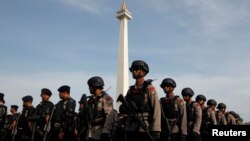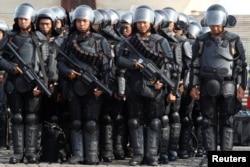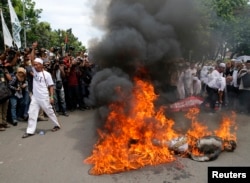Thousands of hard-line Muslims are expected to take to the streets Friday to protest against the governor of Jakarta, a Christian and the first ethnic Chinese in the job, over claims he insulted the Quran.
Jakarta police said dozens of social media accounts were discovered "publishing provocative statements and images" and urging people to take violent action in the name of Islam against Governor Basuki Tjahja Purnama, better known by his nickname "Ahok," including calls to kill him.
"We have seen racially and ethnically divisive statements being spread online, and there are indications many of them are anti-Chinese," said Jakarta police spokesman Awi Setiyono.
He added police were stepping up patrols and online monitoring in a "show of force" ahead of Friday's rally.
About 18,000 police and military personnel will be deployed on the day of the protest.
Little containment seen
Critics, however, slammed Indonesia's government for doing little to contain the hard-line Muslim groups that have fueled religious and ethnic tensions ahead of next year's election for Jakarta's governor, which Ahok is contesting.
"Indonesia's spineless political leaders have allowed extremists to seize the momentum and foment religious hatred against the governor ... for more than a month without challenging the substance or methods of their arguments," security expert Sidney Jones said in an online column.
Police are investigating Ahok for alleged religious defamation, after he said his opponents had deceived voters by attacking him using a verse from the Quran. Ahok has apologized for the remarks.
A spiritual leader for the protest organizer, the Islamic Defenders Front, insisted its actions Friday would be peaceful.
"This is not anti-Christian or anti-Chinese action," Habib Riziek said.
The group has had a history of vigilante attacks against religious minorities since it was formed in 1999. It has also frequently protested against Ahok.
Anti-Chinese feeling
Indonesia's population of 250 million includes 3 million ethnic Chinese, many of whom are Christian. The community has faced persecution and violence in the past, most recently during the political and social turmoil that gripped the capital as authoritarian ruler Suharto was toppled in 1998.
Hundreds of people were killed and thousands of ethnic Chinese fled the country as mobs rampaged through Jakarta, looting and burning Chinese-owned shops and houses.
Some fear anti-Chinese sentiment and religious tensions are rising again ahead of the Jakarta governor election in February.
The government has shied away from addressing the rising tensions head on, saying instead it is committed to protecting freedom of expression and assembly alongside Indonesia's diversity.
Earlier this week, President Joko Widodo, whose ruling party backs Ahok, met with party leaders backing the two other candidates in the race, whose camps have been accused of using hard-line Muslim groups to fan tensions.
In joint statements, these political and religious leaders urged protesters to demonstrate peacefully.
Social media cited
Communications Minister Rudiantara said the government was working to counter the online "hate speech."
"Indeed, social media is contributing to the current situation," he said. "The president has made it clear Indonesia's unity is non-negotiable."
The race to lead the sprawling capital of 10 million is often hotly contested, with top political parties jostling to get their candidates elected to a job that is seen as a steppingstone to higher political office.
Widodo served as Jakarta governor for a year and a half before running for, and winning, the presidency in 2014. His rise brought back to power the Indonesia Democratic Party of Struggle, which had spent a decade in opposition.
One of his rivals in the governor's race is the son of former President Susilo Bambang Yudhoyono.
Ahok, who took over from Widodo as governor, has gained a reputation as a tough reformer and remains a front-runner in opinion polls.







